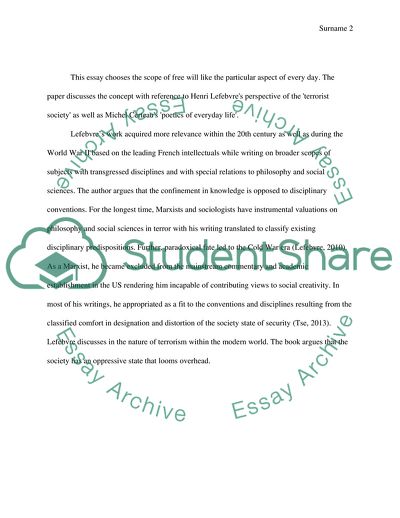Cite this document
(Lefebvre's Terrorist Society and Certeau's Poetics of Everyday Life Essay Example | Topics and Well Written Essays - 2500 words, n.d.)
Lefebvre's Terrorist Society and Certeau's Poetics of Everyday Life Essay Example | Topics and Well Written Essays - 2500 words. https://studentshare.org/philosophy/1865662-choosing-particular-aspects-of-the-everyday-discuss-in-terms-of-henri-lefebvres-notion-of-the-terrorist-society-and-michel-de-certeaus-poetics-of-everyday-life
Lefebvre's Terrorist Society and Certeau's Poetics of Everyday Life Essay Example | Topics and Well Written Essays - 2500 words. https://studentshare.org/philosophy/1865662-choosing-particular-aspects-of-the-everyday-discuss-in-terms-of-henri-lefebvres-notion-of-the-terrorist-society-and-michel-de-certeaus-poetics-of-everyday-life
(Lefebvre's Terrorist Society and Certeau'S Poetics of Everyday Life Essay Example | Topics and Well Written Essays - 2500 Words)
Lefebvre's Terrorist Society and Certeau'S Poetics of Everyday Life Essay Example | Topics and Well Written Essays - 2500 Words. https://studentshare.org/philosophy/1865662-choosing-particular-aspects-of-the-everyday-discuss-in-terms-of-henri-lefebvres-notion-of-the-terrorist-society-and-michel-de-certeaus-poetics-of-everyday-life.
Lefebvre's Terrorist Society and Certeau'S Poetics of Everyday Life Essay Example | Topics and Well Written Essays - 2500 Words. https://studentshare.org/philosophy/1865662-choosing-particular-aspects-of-the-everyday-discuss-in-terms-of-henri-lefebvres-notion-of-the-terrorist-society-and-michel-de-certeaus-poetics-of-everyday-life.
“Lefebvre's Terrorist Society and Certeau'S Poetics of Everyday Life Essay Example | Topics and Well Written Essays - 2500 Words”. https://studentshare.org/philosophy/1865662-choosing-particular-aspects-of-the-everyday-discuss-in-terms-of-henri-lefebvres-notion-of-the-terrorist-society-and-michel-de-certeaus-poetics-of-everyday-life.


